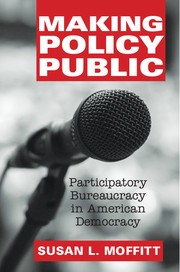Book contents
- Frontmatter
- Dedication
- Contents
- List of Figures
- List of Tables
- Preface
- Abbreviations
- 1 Portals of Democracy in American Bureaucracy
- 2 Participatory Bureaucracy in Practice
- 3 The Development of Public Committees
- 4 Making Educational Performance Public
- 5 Private Knowledge for Public Problems
- 6 Setting the Public Agenda
- 7 Deliberate Participation
- 8 The Impact of Public Advice
- 9 Participatory Bureaucracy in American Democracy
- Appendix
- Bibliography
- Index
- References
3 - The Development of Public Committees
Published online by Cambridge University Press: 05 October 2014
- Frontmatter
- Dedication
- Contents
- List of Figures
- List of Tables
- Preface
- Abbreviations
- 1 Portals of Democracy in American Bureaucracy
- 2 Participatory Bureaucracy in Practice
- 3 The Development of Public Committees
- 4 Making Educational Performance Public
- 5 Private Knowledge for Public Problems
- 6 Setting the Public Agenda
- 7 Deliberate Participation
- 8 The Impact of Public Advice
- 9 Participatory Bureaucracy in American Democracy
- Appendix
- Bibliography
- Index
- References
Summary
This Department and its operating agencies have long been of the view that proper and effective administration requires that meetings of advisory councils, advisory committees, or advisory groups not be open to the press and public. Exclusion of the press and public from the meeting has been deemed necessary primarily to assure the full, unhampered exchange of ideas.
Wilbur Cohen, Secretary of the Department of Health, Education and Welfare, 1968The advisory committee is a reminder that the organization is not monolithic in nature, surrounded by walls and a moat, but rather a system which must depend ultimately for its success upon the relationships it has with those not officially a part of it.
David S. Brown, 1970The loosely stitched terrain of federal committees that developed in the first two-thirds of the twentieth century embodied exclusivity amid profound decentralization. Committees at times reflected the pursuit of “control on the basis of knowledge,” to use Weber’s term, despite limited knowledge and limited control. Public committees in mid-century America operated at the intersection of agency efforts to control the flow of information in and out of the bureaucracy, group efforts to influence executive branch policymaking, and Congressional attempts to figure out and regulate what agencies and interest groups were up to. These three forces can give rise to classic zero-sum power struggles and iron triangles. In some cases, for some committees, they did. What emerged more broadly, however, were institutions culminating in the Federal Advisory Committee Act (FACA) that both bureaucratized and democratized processes of public participation in executive branch agencies. Some of these guiding institutions arose from agency initiatives. Others trace their roots to Congress. The decentralization and exclusivity that characterized public participation in the period leading up to 1972, expressed in Secretary’s Cohen’s quote above, gave way to greater centralization and permeable openness after FACA’s enactment. Centralization offered agencies added muscle to set some of the key terms of public committees’ operations. Procedures for openness also created opportunities for new forms of participation to emerge and to support agency implementation relationships “with those not officially a part of it,” in David Brown’s words.
Information
- Type
- Chapter
- Information
- Making Policy PublicParticipatory Bureaucracy in American Democracy, pp. 55 - 81Publisher: Cambridge University PressPrint publication year: 2014
